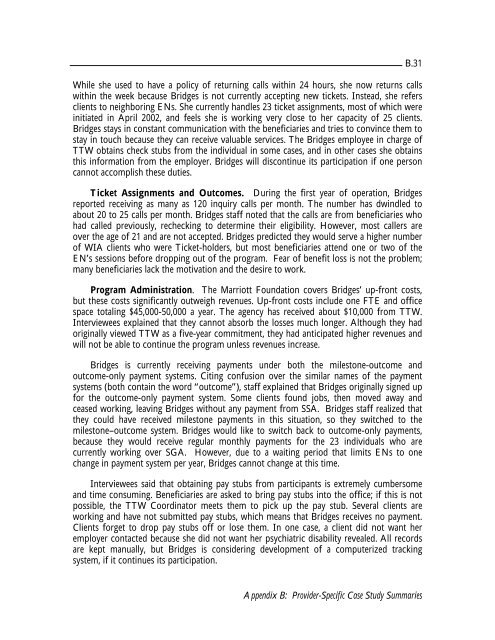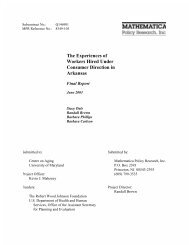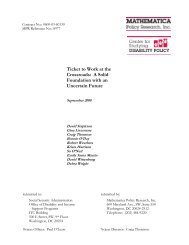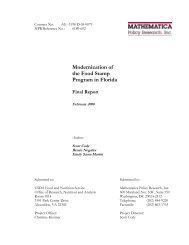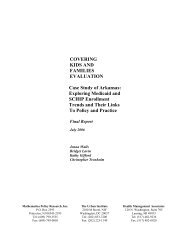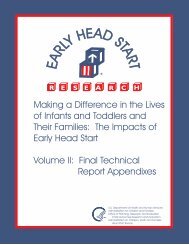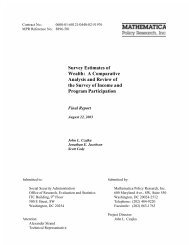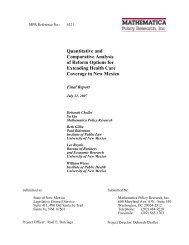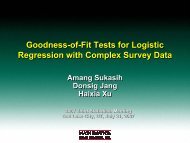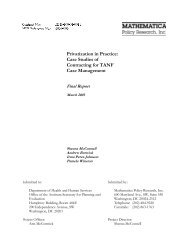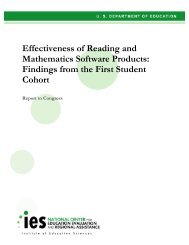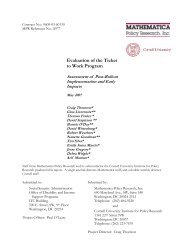Evaluation of the Ticket to Work Program Initial Evaluation Report
Evaluation of the Ticket to Work Program Initial Evaluation Report
Evaluation of the Ticket to Work Program Initial Evaluation Report
Create successful ePaper yourself
Turn your PDF publications into a flip-book with our unique Google optimized e-Paper software.
B.31<br />
While she used <strong>to</strong> have a policy <strong>of</strong> returning calls within 24 hours, she now returns calls<br />
within <strong>the</strong> week because Bridges is not currently accepting new tickets. Instead, she refers<br />
clients <strong>to</strong> neighboring ENs. She currently handles 23 ticket assignments, most <strong>of</strong> which were<br />
initiated in April 2002, and feels she is working very close <strong>to</strong> her capacity <strong>of</strong> 25 clients.<br />
Bridges stays in constant communication with <strong>the</strong> beneficiaries and tries <strong>to</strong> convince <strong>the</strong>m <strong>to</strong><br />
stay in <strong>to</strong>uch because <strong>the</strong>y can receive valuable services. The Bridges employee in charge <strong>of</strong><br />
TTW obtains check stubs from <strong>the</strong> individual in some cases, and in o<strong>the</strong>r cases she obtains<br />
this information from <strong>the</strong> employer. Bridges will discontinue its participation if one person<br />
cannot accomplish <strong>the</strong>se duties.<br />
<strong>Ticket</strong> Assignments and Outcomes. During <strong>the</strong> first year <strong>of</strong> operation, Bridges<br />
reported receiving as many as 120 inquiry calls per month. The number has dwindled <strong>to</strong><br />
about 20 <strong>to</strong> 25 calls per month. Bridges staff noted that <strong>the</strong> calls are from beneficiaries who<br />
had called previously, rechecking <strong>to</strong> determine <strong>the</strong>ir eligibility. However, most callers are<br />
over <strong>the</strong> age <strong>of</strong> 21 and are not accepted. Bridges predicted <strong>the</strong>y would serve a higher number<br />
<strong>of</strong> WIA clients who were <strong>Ticket</strong>-holders, but most beneficiaries attend one or two <strong>of</strong> <strong>the</strong><br />
EN’s sessions before dropping out <strong>of</strong> <strong>the</strong> program. Fear <strong>of</strong> benefit loss is not <strong>the</strong> problem;<br />
many beneficiaries lack <strong>the</strong> motivation and <strong>the</strong> desire <strong>to</strong> work.<br />
<strong>Program</strong> Administration. The Marriott Foundation covers Bridges’ up-front costs,<br />
but <strong>the</strong>se costs significantly outweigh revenues. Up-front costs include one FTE and <strong>of</strong>fice<br />
space <strong>to</strong>taling $45,000-50,000 a year. The agency has received about $10,000 from TTW.<br />
Interviewees explained that <strong>the</strong>y cannot absorb <strong>the</strong> losses much longer. Although <strong>the</strong>y had<br />
originally viewed TTW as a five-year commitment, <strong>the</strong>y had anticipated higher revenues and<br />
will not be able <strong>to</strong> continue <strong>the</strong> program unless revenues increase.<br />
Bridges is currently receiving payments under both <strong>the</strong> miles<strong>to</strong>ne-outcome and<br />
outcome-only payment systems. Citing confusion over <strong>the</strong> similar names <strong>of</strong> <strong>the</strong> payment<br />
systems (both contain <strong>the</strong> word “outcome”), staff explained that Bridges originally signed up<br />
for <strong>the</strong> outcome-only payment system. Some clients found jobs, <strong>the</strong>n moved away and<br />
ceased working, leaving Bridges without any payment from SSA. Bridges staff realized that<br />
<strong>the</strong>y could have received miles<strong>to</strong>ne payments in this situation, so <strong>the</strong>y switched <strong>to</strong> <strong>the</strong><br />
miles<strong>to</strong>ne–outcome system. Bridges would like <strong>to</strong> switch back <strong>to</strong> outcome-only payments,<br />
because <strong>the</strong>y would receive regular monthly payments for <strong>the</strong> 23 individuals who are<br />
currently working over SGA. However, due <strong>to</strong> a waiting period that limits ENs <strong>to</strong> one<br />
change in payment system per year, Bridges cannot change at this time.<br />
Interviewees said that obtaining pay stubs from participants is extremely cumbersome<br />
and time consuming. Beneficiaries are asked <strong>to</strong> bring pay stubs in<strong>to</strong> <strong>the</strong> <strong>of</strong>fice; if this is not<br />
possible, <strong>the</strong> TTW Coordina<strong>to</strong>r meets <strong>the</strong>m <strong>to</strong> pick up <strong>the</strong> pay stub. Several clients are<br />
working and have not submitted pay stubs, which means that Bridges receives no payment.<br />
Clients forget <strong>to</strong> drop pay stubs <strong>of</strong>f or lose <strong>the</strong>m. In one case, a client did not want her<br />
employer contacted because she did not want her psychiatric disability revealed. All records<br />
are kept manually, but Bridges is considering development <strong>of</strong> a computerized tracking<br />
system, if it continues its participation.<br />
Appendix B: Provider-Specific Case Study Summaries


